Interview by Jeff Schmuck
Hey Matt, how have you been?
Great! I'm currently hanging out in Jackson, Wyoming. I have been working hard getting The FullCircle Project episodes out, planning our third trip and have been skiing a ton.
What have you been getting up to this winter?
I have been shooting with TGR all winter, which has been a really awesome experience. I've been shredding a lot with John Spriggs. We've been skiing in and around Jackson and spending a lot of time on the snowmobiles, building BC jumps and skiing lines. Then I'm heading up north in a couple weeks once the season slows down in Wyoming.
As most people know, you're the founder of The FullCircle Project, but it's been a while since we heard anything about it, so give us the scoop on what you've been up to with it.
Well yeah, I should keep the world more up to date with FCP. It's hard balancing this all while still having the responsibilities of a pro skier. But we, at FCP, have been working hard. After the Chile project, we knew we had to keep going with these trips and service projects. We added my friend Caleb Braley to the crew, he is the Service Project Director and has a ton of connections in South and Central America. FCP is also in the process of becoming a legit 501(c)(3) non-profit organization. This 'non-profit' status will help us receive grants and donations for our volunteer trips. Of course no one is making a profit on this, as all of our donor support goes directly into the volunteer project.
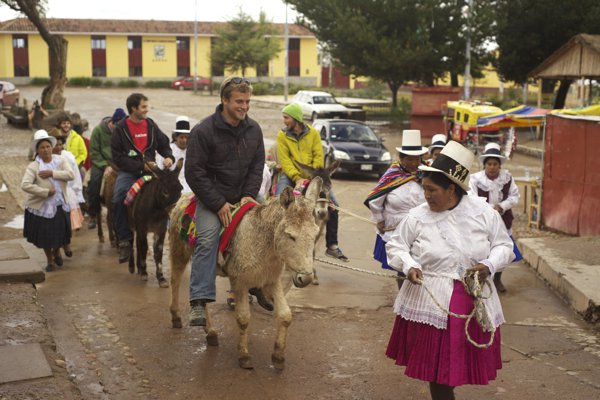
Matt Philippi at a welcoming ceremony in Peru.
When the FullCircle Project first started, you guys set your sights on Chile to assist people in the country following the tsunami and subsequent earthquake that rocked the region, along with getting some skiing in along the way. Where did this year's project focus on?
The focus has really been the same for both projects. The focus was to help out people in need and really make an effort to connect to these communities and people on a deeper level than we are accustomed to on a normal ski trip. The Chile project was made possible because of a Chilean friend I met during a filming trip to Chile some seven or eight years ago (Wild Life by Yellow Snow Productions...anyone remember that?!). My friend down there had his house destroyed by the tsunami and he was down to do some volunteer work to help out others who had been affected by the earthquake and tsunami. Our latest project was in Peru, but it was different in that there was not a natural disaster that had caused the "problem". In Peru, the people we helped out could use our help because of man-made problems. Basically, the community of Maras is poor and is having trouble staying on its feet because of the legacy of colonialism and the poor treatment of predominantly native communities in South America. I mean, the people of Maras are basically the remnants of the Inca (one of the civilizations that was wiped out European colonialism). It's wild, because the people of Maras actually speak Quechua, the language of the Inca, as their first language, although we communicated in Spanish. The people of Maras have been fighting for land rights and water rights for decades. They fought the government to regain control of a salt mine on their land that a North American company had been exploiting for decades. Imagine having a local salt mine and not being able to buy salt because it is all being exported abroad by a foreign company. The town of Maras also had to fight the government to gain full rights to the land of the town and surrounding farms because of the remnants of the Hacienda system, which is a system in which there were a few very rich land owners and a lot of very poor people trying to survive while working on that rich man's land. It was crazy to learn that the people of Maras, Peru, are still dealing with the after effects of these horrible colonial systems. It was eye opening, and saddening, but it was also very inspiring to see the people of Maras fighting for a better life.
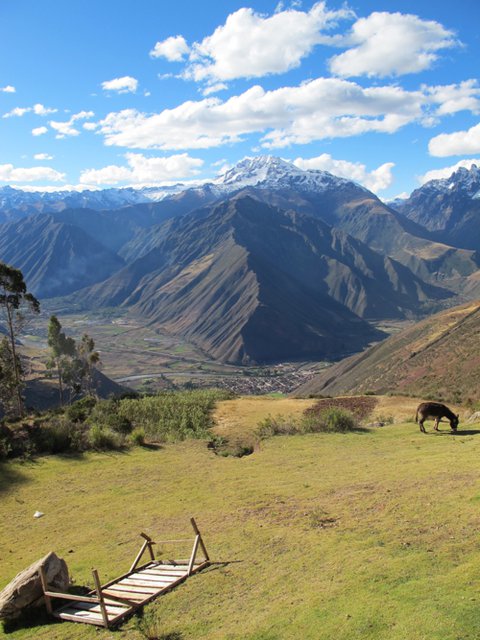
Beautiful Peru.
How did this year's project in Peru differ from the one in Chile?
This year's project was cool because we did not work through any other organization, it was just The FullCircle Project and the town of Maras. We knew exactly where every dollar was going. It was really empowering learning that we did not need a larger organization to work through. All we needed was the personal connections to the people of Maras, funding, and a lot of hard work. Another difference was just where we were. Last year we stayed in city that had been really damaged by the recent earthquake and tsunami. We were walking along streets that had been under 20 meters of water. It was scary, large-scale destruction. Conversely, in Peru, we were in a beautiful quiet village at 12,000 feet and surrounded by 20,000 foot snow covered peaks. It was beautiful and peaceful, despite Maras' history of struggle.
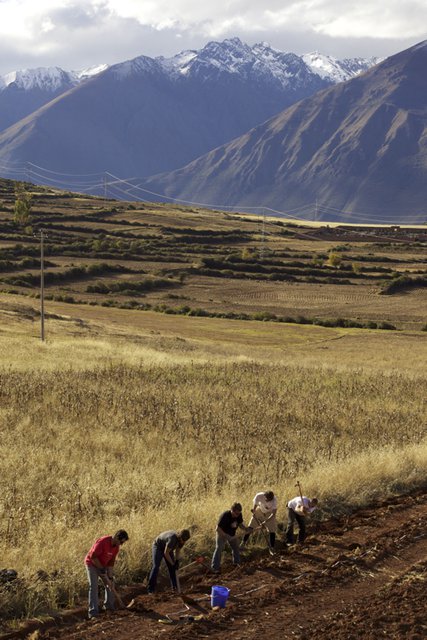
The FullCircle Project working in the fields with 20,000 foot peaks behind them.
Peru isn't too well known as a ski destination, so how was the skiing down there?
We actually didn't ski there. We thought about it and looked into it, but the mountains are gnarly. To ski there it is really more like mountaineering...and I am not a mountaineer. I like to get to the top of my lines with a snowmobile or skins. Maybe I will learn how to climb gnarly routes with ski gear in the next few years, but I don't have those skills yet. However, we have a project planned for Ecuador for the Summer of 2012, and we are trying to ski on a Volcano near by, because we hear you can skin it.
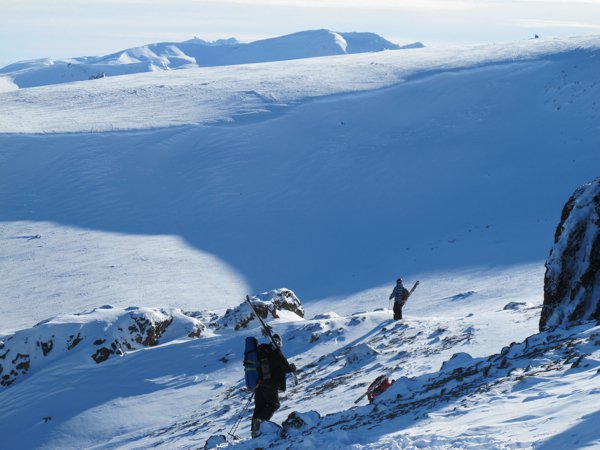
Argentina exploration.
How many episodes of The FullCircle Project will you be dropping over the next little while, and when we can expect to check them out?
There are three episodes that cover the volunteer work in Peru and some skiing in Argentina. I am also going to release a pure skiing edit of the FCP crew over the last two trips and maybe some North American winter footage as well, just to keep the more ski porn-oriented viewers happy. They will be on NSTV over the next few weeks, so stay tuned.
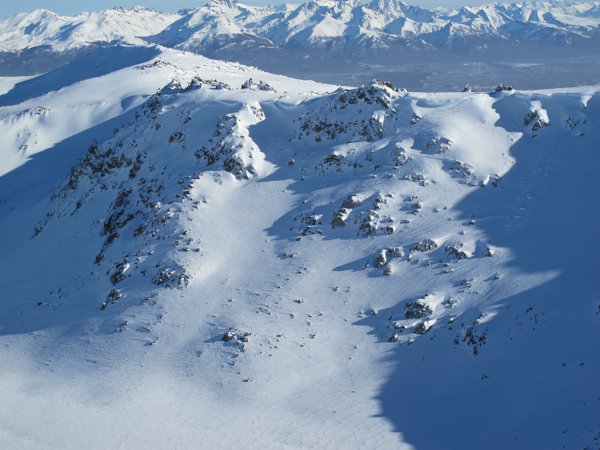
Argentina
What's next for The FullCircle Project?
The plan for now is to continue with a new project each summer. This upcoming summer we are headed to Ecuador. The situation this year is that the Tungurahua Volcano erupted and covered surrounding communities in ash. The ash forced evacuations and also ruined farms. These are some of the poorest communities in South America and they survive off agriculture. We are going to fund and help plant a farm using a self-sufficient comprehensive farm model (known as 'granja integral' in Spanish). The farm is one hectare (100m x 100m) and we will plant potatoes, beans, quinoa, vegetables, wheat, barley, and grains. This farm will supply crops for families, livestock, and some food to sell at market as well. It is definitely the biggest and most expensive project we have attempted to tackle, so if you'd like to help out, you can make donations at http://www.TheFullCircleProject.com!
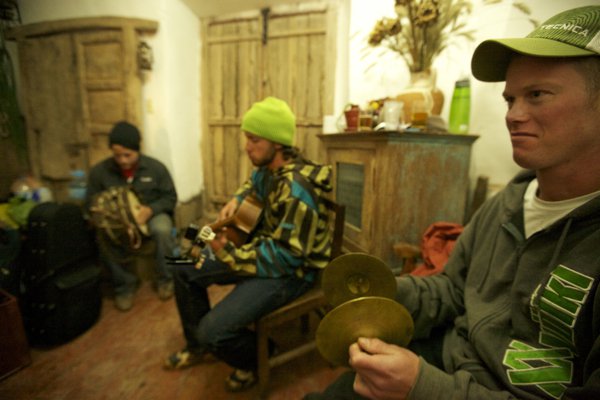
The FullCircle Project taking in some down time in Peru.
And last words and thank-yous you'd like to put out there?
The thank-yous are endless. A big thank-you to Marker/Volkl, Bollé and DNA for supporting our vision. We could not have done this with our donor support. A big up to everyone in the FCP crew for working hard. Thank to our viewers for being supportive of something different in the ski industry. To our viewers, if you like what you see, please share it with your friends and help get the word out there. We are trying to take the positive vibes of the ski industry and take them across the globe to people and communities who are less fortunate than us. The more views and love we get, the more support we will find for out projects. And once again, if anyone can make a donation, that would be awesome, and you can do so at http://www.TheFullCircleProject.com. Keep in mind that all the donation money goes directly to the volunteer project, not the ski trip! Thanks for all the support, and enjoy the first episode!
The FullCircle Project in Peru - Episode 1

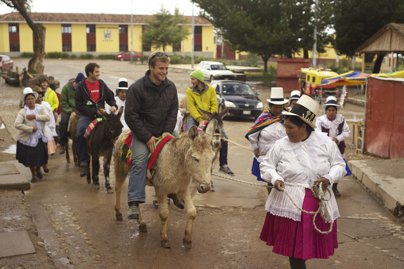
Comments